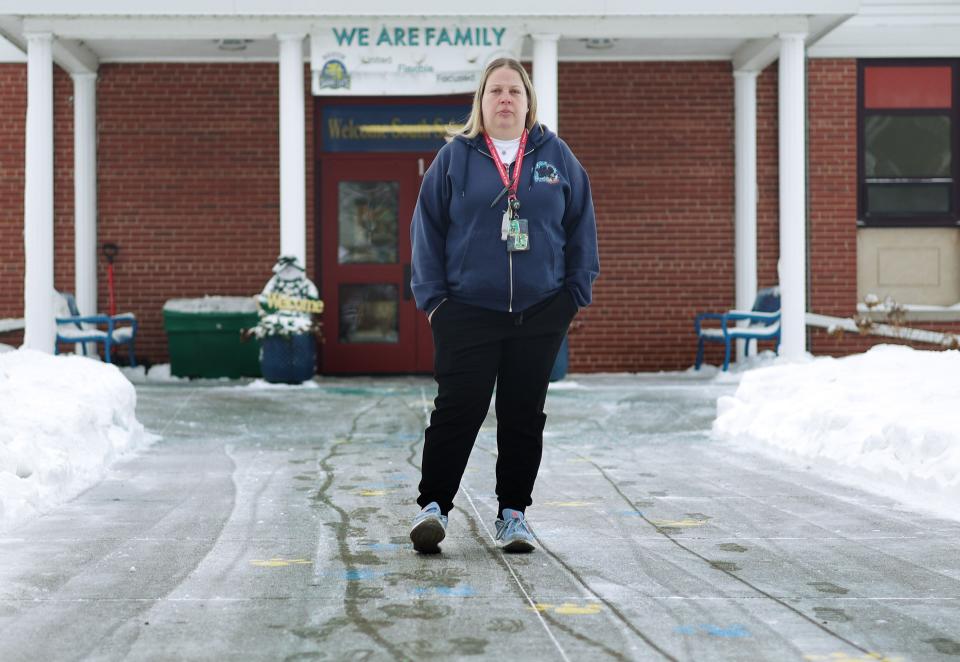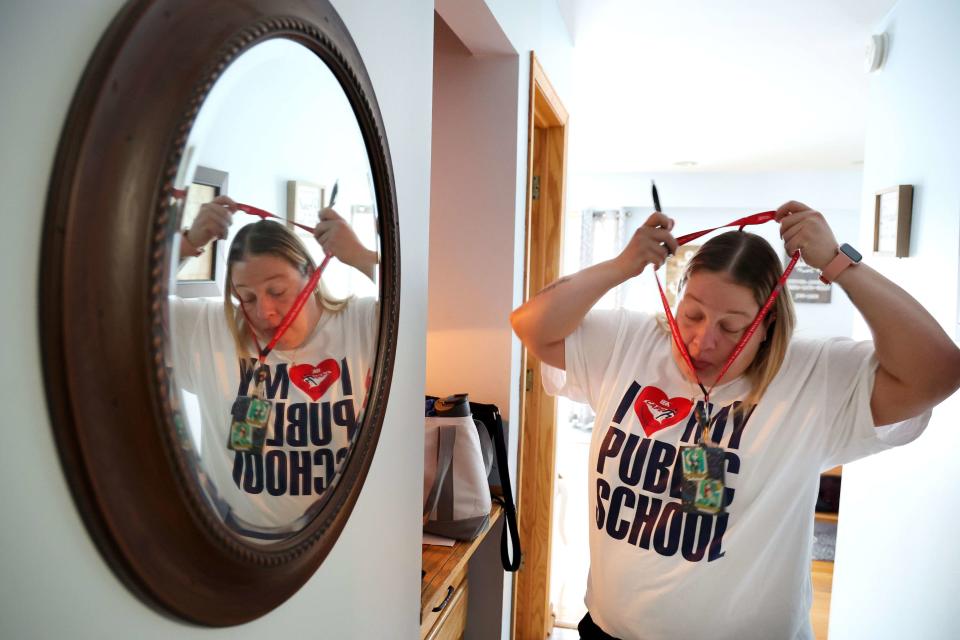Support staff at Crystal Lake D47 file unfair labor practice charge after district hires staffing firm
For $17.88 an hour, Janelle Chaix changes diapers, helps with homework, provides both practical and emotional support — and gets scratched and spit on every so often.
“That’s part of my job,” said Chaix, a paraprofessional, or aide, at Crystal Lake District 47 who works with some students who have autism and are nonverbal. “They can lash out in different ways and as a ‘para’ with these kids, you have to understand them. We don’t have the help. We don’t have the resources to give them the one-on-one they need or the consistency.”
Crystal Lake Association of Support Staff, or CLASS, the union representing Chaix and more than 100 paraprofessionals across 12 schools in District 47, filed an unfair labor practice charge with the Illinois Educational Labor Relations Board in October after district administrators retained a recruiting firm to hire temporary employees. The union said the move was made illegally and without giving them notice.
“It’s a slap in the face and goes to show how much they don’t value the current employees they already have,” said Stephanie Lierance, union president and a learning resource paraprofessional at South Elementary. “Instead of coming up with thoughtful, long-term solutions to address these issues, the district waited until the last minute to bring in temporary help who aren’t committed to our students and our community — apparently they don’t have money to pay us, but they do have money to pay a contracted company.”
Sunbelt Staffing, the agency tapped by District 47, will earn up to $65 for every hour a temporary employee works, according to a contract obtained by the Tribune. The union said the rate is more than four times as much as newly hired, permanent paraprofessionals make.
Chaix, who started as a lunchroom supervisor and is now in her fourth year as a paraprofessional at South Elementary, is one of hundreds of “paras” at the McHenry County district, many of whom report being overworked, burned out and underpaid.
The problem is widespread as schools nationwide struggle to fully staff classrooms with educators and support staff.
Chaix works mainly with second and third graders with individualized education plans, which help them access the curriculum in a way tailored to their needs. Because she grew up with a brother who has autism, she developed a passion early on for making a difference in student learning, even if it meant a consistently small paycheck.
“We don’t want to get paid less than a Target employee or a Starbucks employee — we can go to all these other places and make more money,” she said. “We do it because we have a passion for these kids. We love these kids. We want to see them succeed. We love to see them grow. And that’s why we’re sticking this out. And the ones sticking it out want what’s better for everyone.”
The starting pay for newly hired paraprofessionals at District 47 is $16.14 an hour, according to its board of education. The rate will increase to $16.54 next year. But that isn’t enough, said Lierance.
“You can’t live on a paraprofessional salary,” Lierance said. “I make about $20,000 a year. That doesn’t even cover the cost of insurance that the district offers us. I’m fortunate in the fact that my husband makes a decent living, but I know a lot of parents that have had to leave and go find other full-time jobs because they can’t afford to feed their families.”
The starting pay for the temporary paraprofessionals the staffing agency hires is between $30 and $35 per hour.
Mary Ruffino, a single parent with two sons, said she often thinks about leaving District 47, where she has been a paraprofessional for nine years, for a better-paying job. Ruffino supports students at Bernotas Middle School and makes $18 an hour.
“With me buying clothes for my teenagers, trying to get food on the table, trying to pay auto insurance along with the cellphone bills, it’s just really hard,” Ruffino said. “The pay that I have now is the only source of income I’ve got.”
There is a shortage of paraprofessionals across the state. A Senate bill passed in 2022 as part of Gov. J.B. Pritzker’s legislative package addressing the nationwide teacher shortage lowered the age requirement for paraprofessionals to 18.
The law that went into effect last year provided prospective educators a chance to start their careers earlier and allowed school districts to hire students out of high school. But the needs remain.
Anthony Loizzi, attorney for the District 47 Board of Education, said the district was short 30 paraprofessional positions weeks before the 2023-24 school year began. About a dozen of those vacancies were for special education.
“So those are going to be paraprofessionals that are going to be serving the kids with special needs and where we have legal obligations to provide them with these services through an individualized education plan, or an IEP,” Loizzi said. “If we were unable to provide those services, we were legally liable for violating their IEP and violating both state and federal law for not providing the services we’re obligated to provide.”
Loizzi said the district used Sunbelt Staffing to help fill the special education jobs last-minute.
“Obviously the school district doesn’t want to pay $60 to $65 an hour for paraprofessionals; we would rather hire our own employees, but those positions were for our kids with the highest needs,” he said, adding that a labor shortage has the district competing with private sector employers who can quickly increase wages and benefits without having to negotiate with unions.
The union believes it’s easier for the district to contract out hard-to-fill positions because if it increased new hire wages and offered health insurance to attract employees, it would need to apply the same benefits to current staff.
“This would mean the district has to spend the actual revenue allocated for educational services, verses saving the money like they’re some sort of bank,” the union said.
According to an indicator portal on the Illinois State Board of Education site that’s used to understand a district’s fiscal health, District 47 had 327 days of cash on hand. ISBE recommends maintaining a minimum of 180 days, or six months, of cash on hand.
Paraprofessionals are typically hourly workers who not only support students with disabilities but also supervise individual or small-group work in elective classes like wood shop. They also help with behavior management and handle setting up and cleaning up classrooms, said Lierance.
“There is no aspect of a student’s life that we don’t touch,” said Debra Ward-Mitchell, a paraprofessional in her 40th year at south suburban Thornton Township High School District 205. “From getting them off the bus to making sure they go to lunch, to helping them dress and change for P.E., to getting them to the nurse to administer their medications — we are doing even more than what’s on paper.”
Ward-Mitchell, who was the 2022 National Education Support Professional of the Year, said a shortage of support staff has a ripple effect on the entire student body. She said that most of the help goes toward special education classes, leaving other students without assistance.
“Non-special education classes just don’t get a para anymore,” she said “We’re just not available to help them because of the shortage.”
Ward-Mitchell said 40 years ago, she made $8,000 a year as a paraprofessional and even though she now sits at a higher salary, it’s not why she does the job.
“There has always been job security: I had a special needs child at 22 weeks gestation so I needed to have insurance; I needed to know that I was getting a paycheck every two weeks,” she said. “But the No. 1 reason you stay is the students. When you can touch and make a difference in one life, you’ve done what you were supposed to do.”
Meanwhile, in Crystal Lake, Loizzi said the district understands the need for a wage adjustment for the whole bargaining unit, but there have been recent wage hikes and more to come.
According to the district, union-represented paraprofessionals received a $1.50 an hour bump last February, when the starting pay was $14.25.
The union said those wage increases were negotiated but the district still refused to offer financial assistance toward medical insurance payments, which led to a mass departure of support professionals seeking medical insurance elsewhere after the COVID-19 pandemic.
Loizzi said before offering more raises, the district first wants to address the vacancies and replace the contracted employees with full-time paraprofessionals.
Kristen Goodman, a learning resource paraprofessional at Coventry Elementary in District 47, said a job starting at $16 per hour is a hard sell for candidates who don’t have a vested interest in student learning and growth because a great deal of the work is tending to behavioral needs.
“In the past few years I’ve been hit, I’ve been kicked, I’ve been bit — I’ve been spit on,” Goodman said. “And with the physical things, it’s more the younger kids in kindergarten or first and second grade, where it’s more of a behavioral world now than it really is a learning resource world.”
Goodman said the wage increases have barely made a dent over the six years she’s been a paraprofessional.
“I was making $12.75 an hour. How is it that my teenager got a job at Best Buy making more money than I do?” Goodman said. “Then, after contract negotiating, I got bumped up to $15 an hour, and again, my teenager was making more money than I was as a licensed paraprofessional.”
District 47 said the temporary paraprofessionals recruited through Sunbelt Staffing were hired on three-month contracts that ended mid-November. The district extended two of those contracts based on the needs of the classroom to which they were assigned.
Had the district approached the union before the school year started, Lierance said, they might have been able to come to some agreement without violating their contract and disrupting the students.
“I felt bad for the kiddos because it’s one more thing to work through,” said Chaix, the District 47 paraprofessional. “I had to train someone for a month, two months, and then they had to leave. Our kids need consistency, and a Band-Aid isn’t going to fix the deeper issues we have going on.”

 Yahoo Finance
Yahoo Finance 


